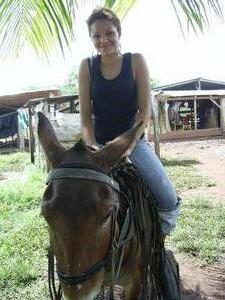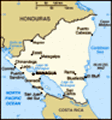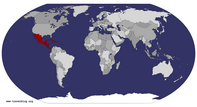Advertisement

 Horse & rider.
Horse & rider.
This is the pony/horse that I rode back from the farm. Poor thing was EXHAUSTED by the time we arrived!The past few days I have had some pretty cool experinces: possibly some of my favourite since I arrived! It began on Saturday, when I accompanied a neighbour of mine to her organic farm, and learned how to make organic fertilizer. There is a lot more to it than just composting and putting cow manure on the plants-- it is in fact a very time consuming and elaborate process to ensure that the fertilizer is JUST RIGHT for the plants (Not to acidic, not too wet or dry). Yet this was no ordinary organic farm (that in and of itself sounds odd-- organic farms are basically unheard of, so a "normal" organic farm is pretty much an oxy-moron in the first place!)-- this farm is actually part of a larger project of empowering women farmers (campesinas).
My neighbour, Doña.Modesta, is the founder and President a women´s co-operative (FEMOPRPANG) that she started 10 years ago to help women farmers. Very often campesinas are economically marginalized: though they work just as hard as the men on the farm, even sharing tasks such as planting and harvesting (jobs which in the city would be gender-segregated), they are often excluded from decisions about farm

 Seeta the Nicaraguense folk dancer!
Seeta the Nicaraguense folk dancer!
Me, in full traditional folkdance regalia.management such as selling things, and how income is spent. So FEMOPROPANG was born to unite women, and encourage them to fight for indepence-- things such as demanding that property be put jointly under their name, so they are not left peniless if their husband decides to leave. FEMOPROPANG began as a group of four women discussing their problems abouut farm life for women, and discovering that many of these issues wer applicable for most campesinas. So they began to look for alternatives and solutions. At the start they literally had nothing-- no money, no office-- just spirit and desire for change. Now they have their own office near the central park, and are one of the only 4 women´s organizations here in nueave Guinea.
Their latest project is a small enterprise to make organic fertilizer to sell to local farmers. "This is our response to free-trade, and Nicaragua´s economic dependency", Doña.Modesta told me. Chemical fertilizers are known to have many terrible effects, such as damaging the soil for future generations by robbing it of nutrients and killing necessary bacteria, contaminating water, and numerous health side-effects (particularly dangerous for women during pregnancy). While traditional organic fertilization-methods had been used

 Seeta the organic farmer
Seeta the organic farmer
Here I am stirring soggy palm-tree bark, as instructed by Doña.Modesta. the bark ferments in these wooden troughs for 15 days, before being laid out to drk in the sun. It is then ready for use as plant "food" (fertilizer).for centuries, it is seldom practiced now. Farmers complain that it is too difficult and time-consuming compared to buying pre-prepared chemicals. The start-up costs of organic farming are immense, but in the long-run it is demonstarted to save money that must later be spent to un-do the damage done by chemicals. Yet the immediate benefits of chemical fertilization inevitably win out. FEMOPRPANG has led various seminars informing the pepole of the risks of chemical fertilzation, and encouraging them to take a longer-range view by using organic methods. But, as I said, no body wants to out in the effort. So they decided to make large quantities of organic fertilizer THEMSELVES and sell it, as many local farmers have indicated that they would buy and use it if it were available.
At the farm where the project is underway, I was enchanted. The small compund where they are producing the fertiliser is surrounded by hills of sugar-cane, yuka plants, and avocado, orange, & guava trees (diversifying crop production is another means of preventing soil depletion). These women were incredibly well-informed about such issues, and were determined not to let the big Multinational chemical Corporations win out (who will offer "free" start-up fertilizer to farmers, to get them hooked on the simplicity of it-- and then find that their soil is so depleted that they are DEPENDANT on it). What Western arrogance to think that we alone know the benefits of organic farming and so on. These women, so small in stature, were inspiring in their passion and motivation for change. They renewed my hope that "another world is possible" (slogan of the World Social Forum).
My cool experiences continued on Tuesday, when I led the second of the World back capacitaciónes (workshops) on "power, leadership, self-esteem, and negotiation". I had written the program entirely myself (17 pages in formal Spanish--about which I am very proud!). I have presented the topic twice: once with the youth here in Nueva Guinea, and once with the youth in La Unión (neighbouring colonia, about 2 hours away in truck). In the past we have taken a taxi to la Unión, but this time we took public transit: which consists of the back of a large truck, closed in with a canopy. Sitting amidst farmers with their various wares-- a pile of logs, a chicken, a chainsaw, (and on the way back a tonne of scrap-metal that had to be heaved onto the roof, making me wonder how sturdy that canopy really is)-- and chatting with strangers who didn´t know that I´m a foreigner, I felt so happy to be travelling just like everyone else. It was great!
The capacitación itself went well, I thought. I had learned a lot from the first time around when I led the session in Nueva Guinea last week, when one student commented that it was "Good, but a bit boring". So I changed it so as to be a bit more dynamic, vowing not to let that comment get me down about what I have achieved. And really, teaching for 3 hours on these 4 topics, particularly moderating and guiding the discussion, is quite an achievement in terms of my language proficiency. Though I am very thankful that I only had to do this (my main reason for being here) NOW, (2/3rds of the way through the internship-- I can´t believe how time flies!) as I don´t think my Spanish would have been up to it before this.
After the capacitación we went to visit my friends marisela´s farm on the outskirts of La Unión. "It´s about a 20 minute walk", she assured us, "Not long". An hour later, covered in mud from jumping across
2 rivers and walking along the unpaved dirt track in the forest, we finally arrived! I have to remember that the sense of TIME and DISTANCE is difefernt here! When I later inquired as to why country campesinos always exaggerate and tell you a shorter time or distance than it really is-- saying for example, "It´s REALLY close: just around the very next corner!", refering to somewhere that may be up to 2 hours away-- they explained that it´s not so much exaggerating as that they have a diffrent conception of what constitutes "far". When u are used to walking miles every day, 2 hours indeed seems close: "Just around the next corner". An interesting cultural nuance to bear in mind when travelling, and estimating the time to your next destination!
We were muddy and exhausetd by the time we finally saw the little finca (farm) perched on the top of the hill. What a welcome sight! But it was worth it, as the farm was wonderful: Avocado trees, mango, coconut trees (the farm-help cut some down for us, and we snacked on fresh "coaco"-- mm-mmm! Nothing like it!). I can totally understand why people here prefer the quite country life to that of the city. The combination of this farm, and Doña. Modesta´s farm has made me think that when I retire one day I want to have a little finca of my own...!
While we were at the farm it began to pour with rain (it being rainy season), but we had to get back to the town to catch the last bus/truck back to Nueva Guinea. So ponies it was! I was thrilled! Until I saw the state of the track: which the rain had convereted into less of a "track" than a mud-slide. I have ridden b4, but never under such conditions. The rain made it tough-going up the purely-muddy inclines, the poor pony panting and snorting with the effort as its hooves slid backward in the mud...I won´t say I wasn´t nervous (looking at the drop if we fell, which was relatively small, yet wondering if I would die if the horse landed on top of me!), but I enjoyed evey second of it nonetheless! We arrived back in La Unión just in time to run for the truck-- covered in mud up to my knees, hair a complete distaster, but grinning from ear to ear.
The cool cultural experinces continued when yesterday I learned how to do Nicaraguan folkdancing! It was totally-random, as I walked past one of the classes in URACCAN and heard music. When I popped my head in and saw them pracicing, I asked if I could join. There are only two basic steps, like a small shuffling motion of the feet, which I picked up with ease ("You should join us, you have natural talent!" they congratulated me). But the best part for me was getting to try on the traditional costume-- a beautiful long white skirt and matching off-the-shoulder top. I felt like a princess as they circled around me, laughing and helping me to put it on. Definately a highlight of my trip so far!
PS. I tried to attatch pics, but the system hasn´t been working properly of late, so only 3 turned up: sorry!
Advertisement
Tot: 0.083s; Tpl: 0.011s; cc: 8; qc: 51; dbt: 0.0454s; 1; m:domysql w:travelblog (10.17.0.13); sld: 1;
; mem: 1.2mb









